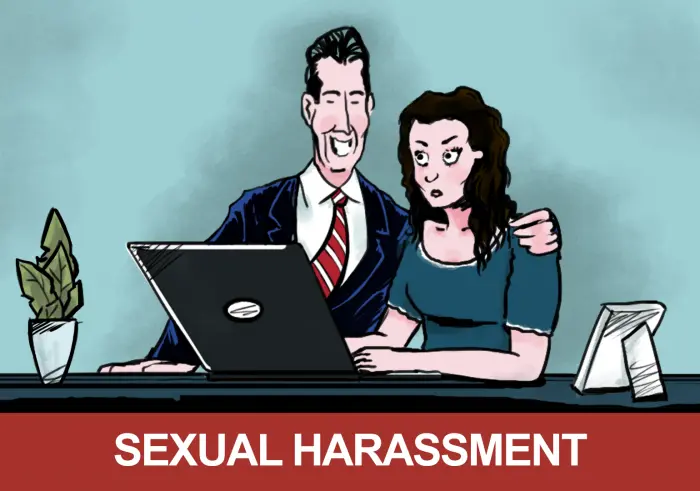How Should You Handle Sexual Harassment At Work?
Your questions about sexual harassment in the workplace, answered

But what should you do if you experience sexual harassment at work? What are your rights, and how can you protect them?
Our FAQ answers your questions about handling sexual harassment at work.
How do you deal with sexual harassment at work?
Unfortunately, many people experience sexual harassment at work. But how should you deal with workplace sexual harassment?
In most cases, the first step should be to document the harassment and say something about it to a supervisor or HR. A sexual harassment lawyer can also help pursue legal remedies.
It’s also important to recognize the harm caused by workplace sexual harassment. You may experience depression, anxiety, or fear as a result. Reach out to your friends and family for support, and consider speaking to a therapist.
What are your sexual harassment protections?
Sexual harassment in the workplace is illegal.
In addition to federal laws against sexual harassment, state and local laws provide additional legal protections if you experience sexual harassment. For example, sexual harassment laws do not only ban supervisors from harassing subordinates.
Sexual harassment laws also protect you if the harasser is a coworker or subordinate.
When harassment takes place, you need to know how to deal with sexual harassment in the workplace. Victims and witnesses should keep records about the situation, including the names of everyone involved, the harassment, and any reports to supervisors or HR about the incident.
How to deal with sexual harassment at work as a manager
Employees in junior positions aren’t the only ones who can be victims of sexual harassment. Managers may also be the targets of sexual harassment at work.
Managers can be sexually harassed by their supervisors, by other managers, or by the employees they supervise.
Only a supervisor or boss can be guilty of quid pro quo sexual harassment, such as requesting sexual favors for a promotion or raise. But any employee can be guilty of unwanted contact or creating a hostile work environment for which the employer may be held liable.
As with other cases of sexual harassment at work, managers can report the sexual harassment internally and contact a sexual harassment lawyer to protect their rights.
How sexual harassment is handled in workplace settings
Companies have different policies about how to handle sexual harassment. Some take reports or conduct internal investigations, while others have less formal procedures.
Regardless of internal corporate policy, victims of sexual harassment have protections under federal, state, and local laws.
When sexual harassment occurs, employees should consider reporting it. No matter how sexual harassment starts or how sexual harassment happens, employees have legal protections.
For example, if you report sexual harassment to your company or to an agency like the EEOC, your company cannot retaliate against you.
How do you report sexual harassment at work?
If you witness or experience sexual harassment at work, you can report it internally. Many companies have policies about reporting sexual harassment, which may include reporting the harassment to a supervisor or human resources.
Whether you make an informal or formal complaint, it’s a good idea to report sexual harassment in writing and keep a copy of the complaint.
As for how sexual harassment can be addressed in the workplace, companies set their own policies to stop sexual harassment.
Employers have a responsibility to provide a work environment free from sexual harassment. If the harassment continues, or if a supervisor or boss is the harasser, victims of sexual harassment can contact a sexual harassment lawyer to protect their rights.
How do you prove sexual harassment at work?
If you experience sexual harassment at work, collecting evidence can help prove your case.
Create a sexual harassment log to keep detailed records of the sexual harassment in writing. Record the name(s) of the harassers, the location, the targets, other witnesses, and the date, as well as any other details that could substantiate the harassment.
It’s also a good idea to keep records that show you reported the harassment to a supervisor or human resources. Keep written records and notes about the company’s response to sexual harassment.
In cases where the harasser was not a supervisor or boss, the company may only be liable if it failed to address the harassment or showed negligence after receiving reports of the harassment.
When you contact a sexual harassment lawyer, make sure to mention the evidence you have collected to prove sexual harassment occurred.
How sexual harassment affects the victim
Victims of sexual harassment may struggle with depression, anxiety, or fear. It may be difficult to return to work or to face the harasser.
Studies show how sexual harassment can affect mental health. Keep in mind that there is no one reaction to sexual harassment in the workplace.
In addition to understanding how sexual harassment makes you feel, you can pursue legal remedies. You may be entitled to a financial settlement because of sexual harassment at work.
Companies also have a responsibility to consider how sexual harassment affects employees and to stop workplace sexual harassment.
What to do about sexual harassment
Many targets of sexual harassment struggle to figure out how to deal with sexual harassment at work.
If you experience sexual harassment or a hostile work environment, you can contact a sexual harassment lawyer for a free consultation. You may be entitled to compensatory damages, punitive damages, or other financial settlements.
A sexual harassment lawyer can help protect your rights. In the New York City area, sexual harassment lawyer Charles Joseph offers free consultations. Charles Joseph brings over two decades of experience with sexual harassment cases, and his firm has recovered over $140 million for clients.
You can also read more about your sexual harassment rights: Sexual Harassment Rights, Laws, and Potential Damages
